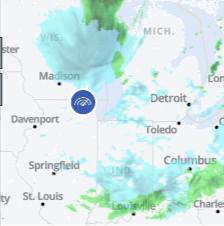At a meeting with Chicago Police Superintendent Eddie Johnson and other big city chiefs Thursday, Attorney General Jeff Sessions made no mention of the sweeping reforms the Justice Department had outlined and demanded of Chicago just two months ago.
In January, outgoing Attorney General Loretta Lynch announced findings of a year-long investigation of Chicago Police, concluding that the department was plagued by a “pattern and practice” of unreasonable force and abuse.
The over 150 page Justice report called for a sweeping series of reforms, enforced by a binding consent decree to be overseen by an independent federal monitor. But Sessions is known to disdain such agreements. And after Thursday's meeting in Washington, Chicago Police officials indicated the topic of a consent decree did not even come up.
“We need to reform,” Johnson told reporters on the Justice Department steps. “And we agreed to work collaboratively to reform the CPD.”
A Chicago Police spokesman said Sessions expressed a view that DOJ’s role is to help local police do their jobs, while at the same time treating the public “fairly and equitably.” But he added that the meeting was 90% focused on reducing violent crime in America’s cities.
“There was not a formal conversation of what’s going to happen in Chicago,” the spokesman said.
Just two weeks ago, shortly after his swearing in, Sessions said he had read a summary of the Chicago report, and that he was worried that police were pulling back because they worried about getting in trouble.
Local
“We need to help police departments get better, not diminish their effectiveness, and I’m afraid we’ve done some of that,” Sessions told a group of Attorneys General in Washington. “So we’re going to pull back on this.”
The January DOJ report had offered a scathing assessment of policing in Chicago.
“It is imperative that the city rebuild trust between CPD and the people it serves,” the investigators concluded. “It has been broken by systems that have allowed CPD officers who violate the law to escape accountability.”
Noting that CPD was plagued by poor training, lax accountability, and anemic investigations of wrongdoing, the report’s authors warned that a court-monitored consent decree was the only way to move forward on reforms.
“It is not likely to be successful without a consent decree with independent monitoring,” the report concluded.
Both the Mayor and Johnson have insisted that no matter what is done in Washington, Chicago is prepared to press ahead with its own reforms. On Tuesday, Johnson rolled out a series of new policies, many of which directly addressed concerns from the DOJ report.
“We’re not waiting on them to decide for us whether we should reform or move forward,” Johnson told reporters. “What’s necessary is reform. That’s what’s necessary.”
This week, ousted United States Attorney Zach Fardon declared that a binding consent decree was essential to repair what he called an “atmosphere of chaos.”
“If you leave correcting those deficiencies to the vagaries of city politics,” Fardon warned, “then you likely lose the long term fight.”



